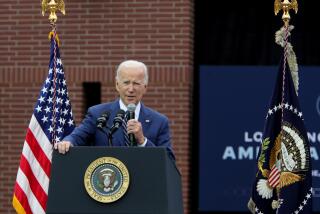Good-Health Discounts May Be Mandated : Reform: The Clinton Administration task force considers requiring medical insurers to charge reduced rates to those who have a wholesome lifestyle.
- Share via
WASHINGTON — The Clinton Administration may require health insurers to offer modest premium discounts to those who practice healthy lifestyles--especially nonsmokers, but perhaps even couch potatoes who enlist in “wellness” programs, sources said Monday.
A possible discount on health insurance premiums is a previously undisclosed element of a broad agenda to reform the insurance industry as part of a national health care reform initiative taking shape under the direction of Hillary Rodham Clinton.
The presidential Task Force on National Health Care Reform, which Mrs. Clinton chairs, has not yet made a final decision on the proposed “wellness” discount, or whether to require it through legislative mandate or try to persuade insurers to offer it voluntarily.
But either way, the idea of such a discount clearly fits well with the emerging health care agenda’s emphasis on preventive medicine, including childhood immunizations and prenatal care for pregnant women.
One White House source called such a premium discount “more symbolic than anything else,” since it is unlikely to amount to much more than $5 per month and since serious questions can be raised over how to monitor the behavior of those receiving the discounts.
Still, with a reform agenda that is likely to require higher taxes from a broad segment of the population, even a modest premium discount could be well received, analysts said.
But far more important than any windfall to consumers is the potential long-term systemic savings that would accrue if financial incentives prove effective in deterring unhealthy behaviors.
“Wellness” discounts have become common in life insurance policies, but they are still rare in the health insurance field, according to health insurance officials, who confirmed Monday that they have discussed such discounts with senior task force personnel and have pledged their support.
Operating behind closed doors, the presidential task force, chaired by the First Lady, is entering a “narrowing” phase of its 100-day timetable in which key decisions are to be made on the components of a comprehensive health care reform proposal that President Clinton intends to send to Congress by the end of May.
The task force also is seriously considering recommending “sin tax” increases on tobacco and possibly on alcohol and handguns to raise revenues to help fund the reforms, which include providing coverage to the estimated 37 million uninsured Americans.
Mrs. Clinton already has stated emphatically that the Administration intends to bar insurers from denying coverage to those with pre-existing medical conditions. Such a ban would eliminate the widespread fear that a job change could cause a person and his or her family to lose medical coverage.
Other insurance reforms likely to be recommended by the task force are the standardization of claims forms and a requirement that insurers offer premiums based on so-called community rating, meaning that firms must set premiums based on the average cost of insuring all people in a large geographic area--without making adjustments based on any individual’s medical history or that person’s likelihood of needing costly medical attention.
Analysts and task force members said Monday that a “wellness” premium discount would not necessarily undermine the notion of community rating, even though it might seem to set special rates for a group of people based on their expected needs for medical services.
The value of promoting healthy lifestyles has not been lost on some of the nation’s large employers, who in recent years have begun offering incentives to encourage “wellness” lifestyles among their work force.
For instance, Johnson & Johnson, a pioneer in the field, figures that up to 25% of illnesses among its 30,000-plus workers are potentially preventable, and so it offers free medical checkups and has built a gym for employees.
Mrs. Clinton spent most of the day Monday listening to public comments about health care at a hearing in Des Moines.
The session, the second of four scheduled public hearings called to highlight the need for health care reform, dealt largely with the needs of rural America. Before the President named her on Jan. 25 to head the task force, Mrs. Clinton had little experience on health care issues--with the notable exception of rural care.
In 1979, during Bill Clinton’s first term as Arkansas governor, he named his wife to chair a 44-member Rural Health Advisory Committee, which devised ways to get health services to people in remote parts of the state.
Among those Mrs. Clinton heard from on Monday was Glee Christ, a nurse who had to drive 140-mile round-trips for routine prenatal care and for the delivery of her baby because there is no pediatrician in her community. Even now, she still has to make that trip from time to time.
Dr. Craig Thompson, a family practitioner in northeast Iowa, told of having to work as late as 10 p.m. because of a shortage of physicians in that part of the state.
More to Read
Sign up for Essential California
The most important California stories and recommendations in your inbox every morning.
You may occasionally receive promotional content from the Los Angeles Times.













